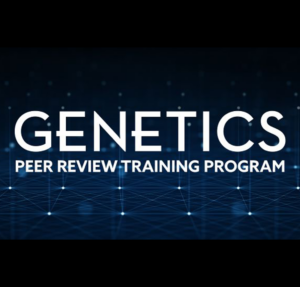
Ed Smith knows the power of having footsteps to follow. Six of his older brothers earned PhDs, he says, and observing their experiences helped him set his course. “It was important to me to learn from them,” he says. “If you have a good role model, you’ll be able to follow their paths, and you don’t make the same mistakes.”
As a professor, Smith has dedicated tremendous effort to providing that kind of support to undergraduate and graduate students in genetics and biomedical programs, particularly those from historically excluded and underrepresented groups. For his work, Smith is the recipient of the 2021 Genetics Society of America Elizabeth W. Jones Award for Excellence in Education, in recognition of his highly successful mentoring programs at Virginia Tech.
Growing up in Sierra Leone, West Africa, Smith recalls getting up at 5 a.m. to work on the farm with his father. From a young age, he associated early rising with physical labor, and expected that earning a graduate degree meant the end of pre-dawn wake-ups. But even now, he starts his day early, relishing the brief peace to get some uninterrupted work time before the daily bustle begins.
“I always thought education took that away, that if you get a PhD there’s no need to get up at 5 o’clock to work,” he says with a laugh. “My postdoc mentor, Susan Lamont, taught me that just like those farmers, you have to get up early if you want to do a lot.”
For his first faculty position, Smith went to Tuskegee University, where he was instrumental in bringing a comparative animal genomics program to the university. “I had never heard of HBCUs,” he says. “I really liked it. Since I didn’t go back to Sierra Leone, this was an opportunity to join an institution that represents my background.”
While at Tuskegee, Smith worked with colleagues at the University of Alabama at Birmingham, Auburn University, Research Genetics (now Hudson Alpha Institute) and Alabama A&M to organize a biotechnology and genomics summer learning program for K-12 students and teachers. He spent 8 years at Tuskegee before moving to Virginia Tech in 2000, where he would have the opportunity to train PhD students and advance his research program in poultry genetics and genomics in the Department of Animal and Poultry Sciences.
At Virginia Tech, Smith played key roles in sequencing the turkey genome and initiated two NIH-funded training programs: the Initiative for Maximizing Student Development (IMSD) and the Post-Baccalaureate Research and Education Program (PREP). The two programs have provided research and training opportunities to dozens of students from underrepresented groups who are pursuing careers in science.
“I was in the first cohort of IMSD students that were brought into Virginia Tech,” says Anjolii Diaz, now an Associate Professor of psychological science at Ball State University. “It was one of the best things that has ever happened to me.”
The programs give students the chance to conduct research and present their results at meetings, but perhaps more importantly, they form a supportive community for students who may be the first in their families to pursue STEM careers. “Our emphasis has always been, if you come, we are a family,” Smith says. “We do a lot of eating together, and we have a lot of interaction so you don’t fall off.” He recalls how his own graduate school advisor, Tom Savage at Oregon State University, used to invite students to come for Thanksgiving dinner. That experience of sharing food created a strong sense of belonging, and Smith says it has shaped his own mentoring philosophy.
“Dr. Smith was always more than just an advisor, he really was a mentor, because he would advocate for each and every one of us,” recalls Diaz. “He was someone that we would always be able to turn to if we were experiencing barriers that we didn’t know how to maneuver.”
IMSD includes both undergraduate and graduate students at Virginia Tech. 85 percent of the program’s grad students completed their doctorate degrees, and 70 percent of the undergraduates went on to PhD programs at schools such as Brown, Yale, and Stanford.
Similarly, PREP recruits students who may not have had research opportunities at their undergraduate institution and prepares them to apply to competitive graduate programs in biological sciences. 88% of PREP participants have been accepted into PhD programs.
After going through the programs, the students go on to form a network of colleagues and friends across institutions. Having a connection with other scientists from historically excluded groups can feel like a breath of fresh air, says Margaret Werner-Washburne, Regents’ Professor Emerita of Biology at the University of New Mexico, who nominated Smith for the award. She recalls the first time she met Smith, as members of an NHGRI study section.
“It’s lonely,” she says. “I’d go to these big meetings, and usually I’m the only Hispanic and the only minority.” Meeting Smith, she says, was like running across a long-lost sibling. The two have kept in touch over the years, and she’s been pleased to see the fruits of Smith’s mentoring programs.
“I had a student who was capable, but his self-esteem was not great,” says Werner-Washburne. “I got him to apply to Ed’s program, and it was miraculous to see the turnaround.”
Part of the programs’ impact comes from the amount of personal effort Smith puts in for each student, says Werner-Washburne.
“A lot of what we have done in terms of minority student development has been to help students see that the magic is inside them,” she says. “Ed Smith is single-handedly transforming science by opening the door to so many students who now feel they are a part of the scientific enterprise, that they belong.”
Smith will accept the award and present an Award Seminar online on Wednesday, May 5, at 1-2 p.m. EDT on “Culturally Aware Research Education: Pay Attention to the Differences”. Register at the button below.
The Elizabeth W. Jones Award for Excellence in Education recognizes individuals or groups who have had significant, sustained impact on genetics education at any level, from K-12 through graduate school and beyond. The award was named posthumously for Elizabeth W. Jones (1939-2008), who was the recipient of the first GSA Excellence in Education Award in 2007. She was a renowned geneticist and educator who served as GSA president (1987) and as Editor in Chief of GENETICS for nearly 12 years.




